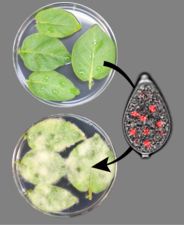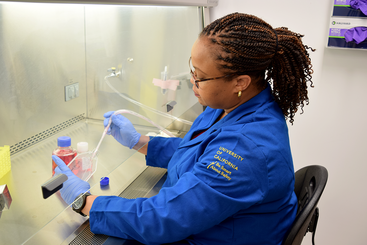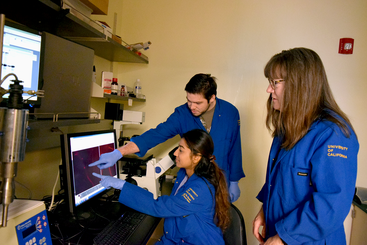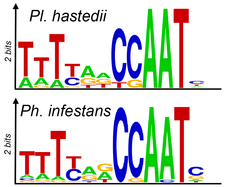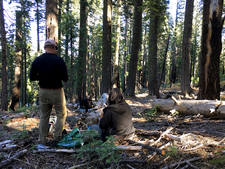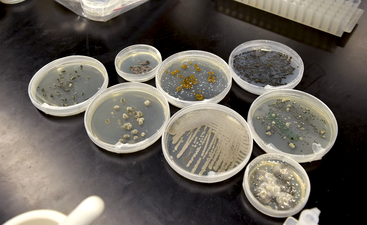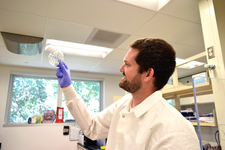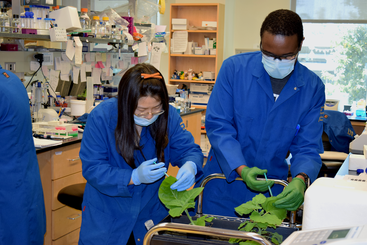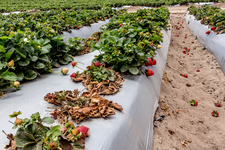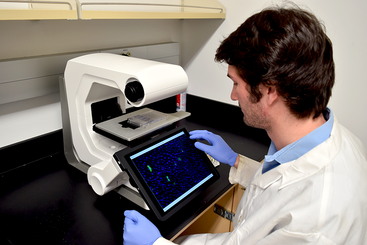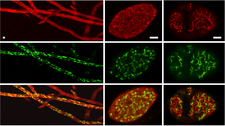CLICK on each research area to learn more or go to our faculty profiles to learn about a specific faculty member's research.
Microbial Pathogenesis
The mechanisms by which organisms become pathogenic and the responses of plants, animals and arthropods to an infectious agent are surprisingly universal.
Our programs integrate the long standing strengths of UCR in plant and vector biology with its expanding biomedical community, providing a multidisciplinary approach to microbiology in agriculture and medicine.
Host-pathogen interaction laboratories are interested in the host mechanisms to defend against pathogens and the strategies pathogens use to establish infection and to suppress host defense responses.
We employ genetics, molecular biology, biochemistry and imaging to investigate the fundamental biology underlying host-pathogen interactions in humans and crops, and model animal and plant host species.
Faculty studying this research area:
Jim AdaskavEG Katherine Borkovich James Borneman SONALI CHATURVEDI
Shou-wei Ding AHMED EL-MOGHAZY Rong Hai Ansel Hsiao
Hailing Jin Howard Judelson FATEMEH KHODADADI Patricia Manosalva
Juliet Morrison James Ng OLAKUNLE OLAWOLE Caroline Roper
JASON ROTHMAN Georgios Vidalakis
Microbial Evolution, Genomics, and Genetics
The last decade has witnessed an unprecedented increase in the number of organisms, most of them prokaryotic and eukaryotic microbes, for which genome sequences are available. UCR microbiologists are using high throughput sequencing and functional genomics technologies to understand evolution of organisms, comparing diversity of microbial communities, or discovering molecules that impact microbial pathogenesis on their hosts.
Molecular and genomic tools are providing new ways to explore functions and roles of plant-associated microbes. Plant Pathologists at UC Riverside use high throughput sequencing and functional genomics technologies to identify microorganisms, sequence and compare complete genomes, evaluate the expression of genes, and explore gene-silencing mechanisms.
These approaches can help identify genes and mechanisms important for disease and adaptations necessary for transmission and association with hosts and vectors. UCR researchers are also developing cutting edge applications of genomic technologies to study plant disease and plant mutualistic symbionts.
Faculty studying this research area:
Katherine Borkovich SONALI CHATURVEDI Patrick Degnan Sydney Glassman
Howard Judelson OLAKUNLE OLAWOLE JASON ROTHMAN Jason Stajich
Environmental Microbiology and Ecology
Environmental microbiology and ecology is a rapidly developing field that investigates the distribution of microorganisms in their environment and the processes they catalyze. UCR microbiologists research the population structure in communities of microbes from soils to intestinal tracts and the impact of ecological changes on their composition. They also explore public health aspects of these communities, including environmental pathogens and engineering practices for treatment of waste products.
The study of organisms in their environment and their evolutionary history enables a better understand the origins and potential management of native- and agro-ecosystems. UC Riverside Plant Pathologists use morphological, molecular and culture-based approaches to study microbes in the rhizosphere and soil, as well as in association with plants, insect vectors and other animals.
This includes comparing the plant-associated microbes of invasive versus native plants, both in California and in their habitats of origin. This effort allows us to search for important mutualistic symbionts and biological control agents for managing our agricultural and natural resources.
Faculty studying this research area:
Microbiome
Microbiome laboratories are interested in the microbial communities that reside on and within humans,animals, and plants.
Microbiome research groups at UCR integrate microbial genetics, high-throughput multiscale biology, germ-free animal and plant model systems, molecular biology, and bioinformatics approaches to investigate how these microbes can contribute to host health and disease.
Faculty studying this research area:
Emma Aronson James Borneman Patrick Degnan Emma Gachomo
Sydney Glassman Ansel Hsiao Caroline Roper Jason Stajich
Plant Disease Management
Management of plant diseases is of singular importance to the discipline of plant pathology. Development of strategies to accomplish that objective is based upon accurate identification of the specific causal agent of a particular disease, followed by sound biological knowledge of the life and disease cycle of that agent.
Weak links in the life and disease cycles are then targeted with specific and efficacious management strategies.
Such strategies include cultural, biological, genetic, physical, chemical, and regulatory approaches, which are applied either alone or combined into an integrated plant disease management program.
Faculty studying this research area:
Jim Adaskaveg James Borneman AHMED EL-MOGHAZY Emma Gachomo
HAILING JIN FATEMEH KHODADADI Patricia Manosalva James Ng
OLAKUNLE OLAWOLE Alexander Putman CAROLINE ROPER Georgios Vidalakis
Molecular and Cellular Microbiology
Microbiologists at UCR employ genetically and biochemically tractable prokaryotic and eukaryotic microbes for study of fundamental biological processes.
These include gene regulation, cell division, signal transduction and cell differentiation. Many of these investigations employ fluorescence microscopy and other modern cell biology techniques.
Faculty studying this research area:
Katherine Borkovich James Borneman SONALI CHATURVEDI Patrick Degnan
Shou-wei DiNG Emma Gachomo Rong Hai Ansel Hsiao Hailing Jin

